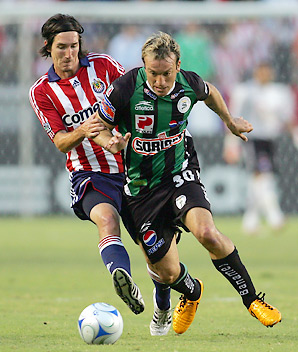Suddenly, SuperLiga matters more
Mexico objected to what it viewed as CONMEBOL's siding far too much with teams from its own confederation when teams from Uruguay and Brazil refused to play Copa Libertadores games in Mexico because of swine-flu concerns. As a result, the Mexican federation withdrew from all competitive agreements with CONMEBOL.
Meanwhile, the competition that instigated the whole spat will continue merrily on as it has since 1960. That's because Mexico's withdrawal simply returns the Libertadores back to its traditional format of only South American teams. Likely gone as a result of the decision are the TV ratings from fans of the Mexican squads and their considerable purchasing power, but that impact won't have too much immediate effect on the Copa.
That's a shame, because the promise of Libertadores participation brought out unmatched passion from Mexican league players, who wanted to prove they belonged among the best teams in the Western Hemisphere. Since participating in South America's version of the Champions League over the past 10 years, they backed up those claims by competing reasonably well, even though a Mexican team only once qualified for the finals, in 2001.
Without Libertadores play this spring, Mexican clubs suddenly find themselves with a lack of international tournaments with which they can flex their muscles. That is, except for SuperLiga, the club competition between Major League Soccer and Mexico's Primera División. Even though SuperLiga is essentially an exhibition show, Mexican clubs have been eager to cement their superiority over their norteño counterparts. "Our fans don't permit us to lose to the U.S. teams," Argentine veteran Christian"Chaco" Giménez said in '07, the year his Pachuca won the inaugural title.
In that first year, Pachuca found itself in a dogfight with the Los Angeles Galaxy in the final, needing overtime and penalty kicks to finally triumph. Last year, no Mexican squad reached the final. However, the idea that this was evidence of any progress for MLS was lost in the howls of protest over what the Mexican players believed were hideously poor calls by U.S.-based officials.
As players angrily denounced the tournament, threatening to boycott future editions, it seemed that the SuperLiga was doomed to remain a quirky, insignificant event, despite the impressive $1 million grand prize. Now, though, in a classic case of "love the one you're with," the SuperLiga may offer Mexican clubs some of the best competitive soccer they're likely to face for a while outside of the already-familiar competition of their own league.
"With these clubs not having other international competitions, you think they'll put a little more weight on it," said Chivas USA midfielder Jesse Marsch, whose squad will compete in SuperLiga for the second time next month. That said, Marsch pointed out there are automatic excuses built in for Mexican teams if they lose.
"It's their preseason and they're playing up here, so it's difficult for them," he said, yet emphasized that Chivas USA would go full tilt at the title. "There are two things that make it important for our club especially: playing in an international tournament and specifically it being against Mexican club teams, and the importance that means for both our fans and our club."
The involvement of Chivas USA is an interesting measuring stick for MLS, given that the team is owned by Jorge Vergara, the same owner of the iconic Guadalajara club that is considered the "big brother" to Chivas USA. It's difficult for any club to establish an individual identity when carrying the colors and the nickname of another that is so well-known. For Chivas USA fans, many of whom are very familiar with Mexican league teams, a different value is placed on victories against clubs from that country.
Even for an Argentine like Giménez, the clash of regional rivalries is clear, making the tournament significant even without any history. "The truth is that we know MLS well," he said. "We know the U.S. national team well. The matches between Mexico and the U.S. are classics at any level, including between the leagues."
Mexican clubs aren't going to forget or easily forgive the referee issues or odd advancement rules of the SuperLiga that caused difficulties last year. But there are limited options on the horizon for other international competitions, and that gives the SuperLiga new relevancy. Then there's the pesky matter of a title to reclaim.
"A Mexican team won it the first year and an MLS team won it the next year," Marsch said, "so there's a bit of an enhanced rivalry."





